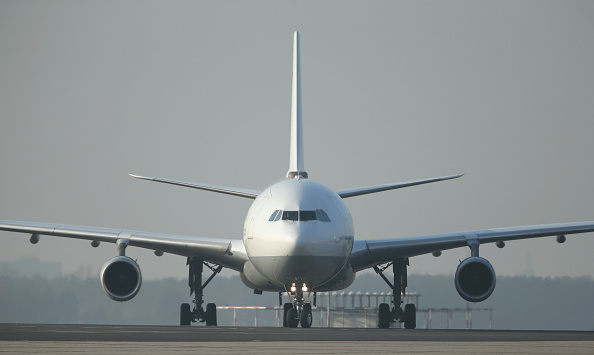
A retrofitted Lufthansa plane equipped with medical isolation facilities for Ebola cases arrives for a media presentation at Tegel airport on November 27, 2014 in Berlin, Germany. The airplane, dubbed the "Robert Koch" and commisoned by the German government, will serve as a MedEvac option for health workers who are in western Africa participating in the international effort to stem the spread of the deadly Ebola virus.
TechRadar reports that the FAA's new warning is now singling out Boeing 737s as the biggest potential victims of 5G wireless interference. In the advisory, they're claiming the C-band transmissions can pose a problem to the radio altimeters of 737s, potentially interfering landing operations at "a small number" of airports where the large planes land.
Despite this, however, the FAA's advisory doesn't apply to landing operations at airports where C-band 5G is still not deployed, as well as those where aircraft are deemed "safe" despite the presence of C-band 5G.
You can check out the full advisory on the FAA website if you want to read it in full. But it does show a few bits of information indicating that the administration is working closely with 5G operators (specifically Verizon and AT&T) to deal with the situation.
As per the advisory, the three organizations "have agreed on steps" that will help more planes to use key airports safely, all while ensuring that the new wireless tech will still be deployed without major compromises to its performance. It is mentioned that the two major US telcos have proved "more precise data" about where they placed their transmitters.
For the unaware, the FAA (alongside several major airline companies) was among the staunchest opponents of widespread 5G rollout last year. Their biggest concern was that radio altimeters (the instruments pilots use to judge how high up they are) operate at the same frequency as C-band, which is integral for 5G wireless tech.
Their initial analysis allegedly pointed to potentially "catastrophic" interference that could be caused by the overlapping frequencies, meaning the pilots won't be able to accurately judge their altitude as they land. But despite this, Verizon and AT&T still went on with their rollout.
Which 737s Will Be Affected By The 5G Interference?
The FAA laid down the exact Boeing 737 models which are covered under their latest advisory concerning 5G. These are as follows: -100, -200, -200C, -300, -400,-500,-700, 0700C, -800, -900, and 900ER. Most of these plane models are heavily used by major commercial airlines.
Furthermore, the administration excluded two specific 737 models from their advisory: the 737-200 and -200C, because they're using SP--77 flight control systems which don't have modes that might be affected by 5G wireless signals.
Notable airlines that use the 737-200 model in the US include Continental Airlines, Miami Air International, North American Airlines, and Pan American World Airways, to name a few. Elsewhere in the world, this specific model is used by military forces as cargo planes. There's no immediately accessible data about the -200C model, though.
SAN FRANCISCO - JANUARY 21: A Continental Airlines plane is guided by a worker as it taxis to the terminal at San Francisco International Airport January 21, 2010 in San Francisco, California. Continental Airlines reported fourth quarter earnings of $85 million, or 60 cents a share, compared to a loss of $269 million, or $2.35 a share one year ago.
As for the affected airports, the FAA is looking to issue something called Notices to Air Missions (aka NOTAMS) whenever an airport's C-band frequencies could pose a risk to landing aircraft's altimeters.





